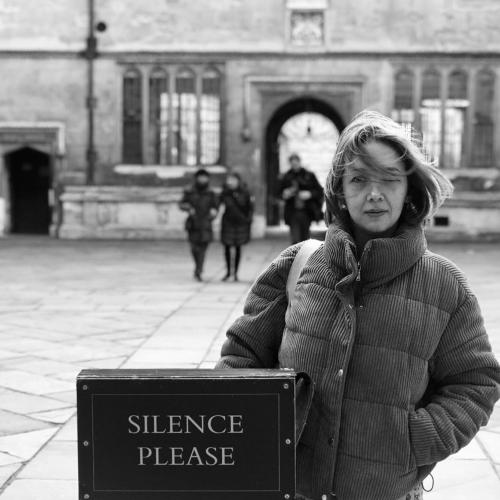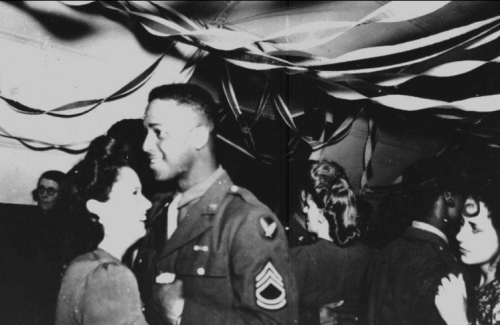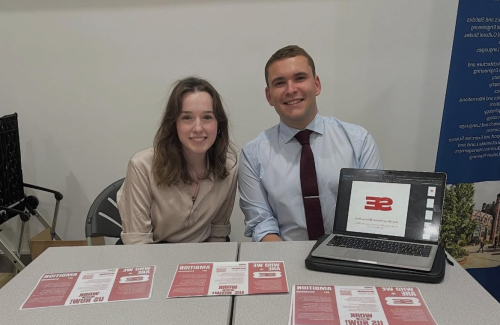
Dr Suzan Meryem Rosita Kalayci
I am a historian of the Eastern Mediterranean in the modern period, with a special interest in the late Ottoman Empire, Modern Turkey, and Syria. I am particularly interested in Armenian Genocide, and have focused on women’s diverse and complex historical experiences both during and after the genocide. I also think and write about the meaning(s) of silence in history, and one strand of my research involves an exploration of the complex relationships between silence, voice and power in historical narratives.
I arrived at Pembroke as a British Academy International Newton Fellow in History in June 2018. My college mentor Dr Adrian Gregory introduced me to the poet and professor of English Literature Kate McLoughlin during my first month in Oxford. This turned out to be a match made in heaven.
With Kate I curated Into Silence during my first year at Oxford. Into Silence was a sold-out series of silent performances featuring film-makers, musicians, sound-installationists, dancers, mime-artists, body percussionists and light-sculptors. Knowledge exchange, public engagement, and performative practices have always been central to my work and collaborating with Kate has been a dream come true. With the professor of Mindfulness Willem Kuyken, we created the Silence Hub (SH) in 2019. Grown from “Into Silence”, SH is an inter-disciplinary and public-facing network enabling those interested in silence to come together to share ideas and experience the power of soundlessness.
In 2020, together with (our very own) Pembroke-based professor of Armenian Studies, Theo Maarten van Lint, I founded UK’s first research network on the Armenian Genocide. The Oxford Network for Armenian Genocide Research builds on the ground-breaking scholarly work produced by the Globalising and Localising The Great War (GLGW) research cluster (which was also mostly based at Pembroke) and hopes to foster new research directions in the study of the Armenian genocide.
Most recently, I have brought together the two strands of my research in Syria and Silence— a project funded by the TORCH’s Humanities Cultural Programme. With the Syria and Silence project I was interested in further developing and expanding the History Faculty’s existing public history activities. I worked in partnership with the Bodleian Libraries and local Syrian community to diversify and extend the reach of the University’s work to new audiences and engage them in multifaceted conversations about the ongoing war in Syria.
Under the umbrella of Syria and Silence, we welcomed over 1000 visitors to a Syria-themed pop-up-library; facilitated 31 community workshops; ran weekly academic seminars for students and academics during MT 2021; launched an oral history project; and hosted public talks from Syrian writers of three different generations. The project also led to a now permanent Space for Reading at Weston Library.
We also increased the participation of under-represented groups including members of the Syrian Oxford community, Syrian refugee community, Syrian and Syrian LGBTQ+ writers. Not only did this involve increased in person participation from these groups, but since the concept was to create a space allowing reflection on Syria, the Syrian people and the ongoing war, we consciously focused on bringing Syrian voices into the forefront via their works of fiction, non-fiction, graphic novels, film, art, music and dance, all of which highlighted Syrian talent and research and created opportunities to learn, share knowledge and breakdown stereotypes.
Genocide education and awareness is at the core of my academic research and I am very passionate about it.
I am especially passionate about enabling a meaningful dialogue about today’s most profound and challenging issues by the way of history education and I regularly give workshops in local schools and community centres on the topic of the Armenian genocide and/or about the violent histories in the Eastern Mediterranean world.
During these workshops, I am sometimes asked why the Armenian Genocide would matter to young adults in the UK. It might not matter to them at all … (they say). But it might matter to them if they understand that if it happened, it could happen again, it can happen everywhere … (I say). And that being human is neither a sufficient nor a prerequisite to having rights: it does not protect us against forced migration, expropriation and war, or (in its last instance) genocide. And, that Hannah Arendt was right when she said all these things; and that she was also right when she said that as humans we have “that great capacity to build a common world together.”
Genocide education and awareness is, in my view, about developing critical resources to recalibrate the project of radical democracy and teaching that to the younger generations because a political system based on equality, freedom and active/engaged citizenship matters.
College role:
I am a Junior Research Fellow at Pembroke College.
University roles:
At the Faculty of History, I am the elected ECR Representative on the Faculty Board. I also sit on the Graduate Studies committee and I am a member of the Gender Equality Working Group.
Affiliations:
I am the Director of the Oxford Network for Armenian Genocide Research, Co-convener of the Silence Hub, and Steering Committee Member of CGIS.
I am also the College Chaplain at St Hilda’s College. You can learn more about my spiritual role at St Hilda’s here.
My first monograph on the topic of the Armenian Genocide is a completely empty book (2010, 2015) which I read at Pembroke College in complete silence in 2017. The book represents my attempt to address the narrow and limiting scope of denial and its effects on historical scholarship in Turkey.
My forthcoming book Reading Silences: Essays on Women, Memory and War in 20th Century Turkey (Degruyter, 2022) is a unique comparison of Armenian and Turkish women’s diverse and complex historical experiences both during and after the genocide. It brings together women’s stories of martyrdom, trauma, and survival and those in which women took active part in genocidal violence.
I have also co-edited a volume on Ireland and Armenia, under the fitting title of Daredevils of History? Resilience in Armenia and Ireland.
News from History
Dr Suzan Meryem Rosita Kalayci

I am a historian of the Eastern Mediterranean in the modern period, with a special interest in the late Ottoman Empire, Modern Turkey, and Syria. I am particularly interested in Armenian Genocide, and have focused on women’s diverse and complex historical experiences both during and after the genocide. I also think and write about the meaning(s) of silence in history, and one strand of my research involves an exploration of the complex relationships between silence, voice and power in historical narratives.
I arrived at Pembroke as a British Academy International Newton Fellow in History in June 2018. My college mentor Dr Adrian Gregory introduced me to the poet and professor of English Literature Kate McLoughlin during my first month in Oxford. This turned out to be a match made in heaven.
With Kate I curated Into Silence during my first year at Oxford. Into Silence was a sold-out series of silent performances featuring film-makers, musicians, sound-installationists, dancers, mime-artists, body percussionists and light-sculptors. Knowledge exchange, public engagement, and performative practices have always been central to my work and collaborating with Kate has been a dream come true. With the professor of Mindfulness Willem Kuyken, we created the Silence Hub (SH) in 2019. Grown from “Into Silence”, SH is an inter-disciplinary and public-facing network enabling those interested in silence to come together to share ideas and experience the power of soundlessness.
In 2020, together with (our very own) Pembroke-based professor of Armenian Studies, Theo Maarten van Lint, I founded UK’s first research network on the Armenian Genocide. The Oxford Network for Armenian Genocide Research builds on the ground-breaking scholarly work produced by the Globalising and Localising The Great War (GLGW) research cluster (which was also mostly based at Pembroke) and hopes to foster new research directions in the study of the Armenian genocide.
Most recently, I have brought together the two strands of my research in Syria and Silence— a project funded by the TORCH’s Humanities Cultural Programme. With the Syria and Silence project I was interested in further developing and expanding the History Faculty’s existing public history activities. I worked in partnership with the Bodleian Libraries and local Syrian community to diversify and extend the reach of the University’s work to new audiences and engage them in multifaceted conversations about the ongoing war in Syria.
Under the umbrella of Syria and Silence, we welcomed over 1000 visitors to a Syria-themed pop-up-library; facilitated 31 community workshops; ran weekly academic seminars for students and academics during MT 2021; launched an oral history project; and hosted public talks from Syrian writers of three different generations. The project also led to a now permanent Space for Reading at Weston Library.
We also increased the participation of under-represented groups including members of the Syrian Oxford community, Syrian refugee community, Syrian and Syrian LGBTQ+ writers. Not only did this involve increased in person participation from these groups, but since the concept was to create a space allowing reflection on Syria, the Syrian people and the ongoing war, we consciously focused on bringing Syrian voices into the forefront via their works of fiction, non-fiction, graphic novels, film, art, music and dance, all of which highlighted Syrian talent and research and created opportunities to learn, share knowledge and breakdown stereotypes.
Genocide education and awareness is at the core of my academic research and I am very passionate about it.
I am especially passionate about enabling a meaningful dialogue about today’s most profound and challenging issues by the way of history education and I regularly give workshops in local schools and community centres on the topic of the Armenian genocide and/or about the violent histories in the Eastern Mediterranean world.
During these workshops, I am sometimes asked why the Armenian Genocide would matter to young adults in the UK. It might not matter to them at all … (they say). But it might matter to them if they understand that if it happened, it could happen again, it can happen everywhere … (I say). And that being human is neither a sufficient nor a prerequisite to having rights: it does not protect us against forced migration, expropriation and war, or (in its last instance) genocide. And, that Hannah Arendt was right when she said all these things; and that she was also right when she said that as humans we have “that great capacity to build a common world together.”
Genocide education and awareness is, in my view, about developing critical resources to recalibrate the project of radical democracy and teaching that to the younger generations because a political system based on equality, freedom and active/engaged citizenship matters.
College role:
I am a Junior Research Fellow at Pembroke College.
University roles:
At the Faculty of History, I am the elected ECR Representative on the Faculty Board. I also sit on the Graduate Studies committee and I am a member of the Gender Equality Working Group.
Affiliations:
I am the Director of the Oxford Network for Armenian Genocide Research, Co-convener of the Silence Hub, and Steering Committee Member of CGIS.
I am also the College Chaplain at St Hilda’s College. You can learn more about my spiritual role at St Hilda’s here.
My first monograph on the topic of the Armenian Genocide is a completely empty book (2010, 2015) which I read at Pembroke College in complete silence in 2017. The book represents my attempt to address the narrow and limiting scope of denial and its effects on historical scholarship in Turkey.
My forthcoming book Reading Silences: Essays on Women, Memory and War in 20th Century Turkey (Degruyter, 2022) is a unique comparison of Armenian and Turkish women’s diverse and complex historical experiences both during and after the genocide. It brings together women’s stories of martyrdom, trauma, and survival and those in which women took active part in genocidal violence.
I have also co-edited a volume on Ireland and Armenia, under the fitting title of Daredevils of History? Resilience in Armenia and Ireland.

